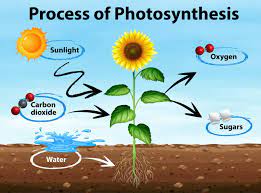What is Photosynthesis?
It is a process used by plants and other organisms to convert light energy into chemical energy that through cellular respiration, can be released to fuel the organisms’ metabolic activities. This chemical energy is stored in carbohydrate molecules, such as sugars and starches, which are synthesised from carbon dioxide and water. Hence the name photosynthesis, from the greek word “photos”, light and“synthesis,” putting together. In most cases, oxygen is also released as a waste product.
Most plants, algae and cyanobacteria perform photosynthesis and such organisms are called photoautotrophs. Photosynthesis is largely responsible for producing and maintaining the oxygen content of the earth's atmosphere and supplies most of the energy necessary for life on earth.
Overall equation for the type of photosynthesis that occurs in plants: 6 CO2 + 6 H2 O -Light C6 H12O6 +6O2 Carbon....

